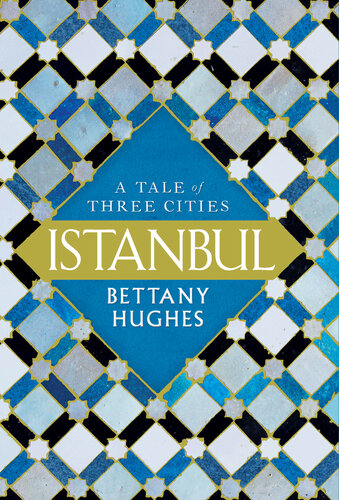
Istanbul
A Tale of Three Cities
کتاب های مرتبط
- اطلاعات
- نقد و بررسی
- دیدگاه کاربران
نقد و بررسی

July 15, 2017
A deeply researched biography of a legendary city, beginning in prehistory.For the past four decades, historian and documentary filmmaker Hughes (Research Fellow/King's Coll. London; The Hemlock Cup: Socrates, Athens, and the Search for the Good Life, 2011, etc.) has had what she calls "a love affair" with Istanbul. Her fascination with the city inspired prodigious research as well as travels throughout the Arab world, Central Asia, and Europe as she engaged in "an archaeology of both place and culture" to chronicle the city's evolution from Byzantium to Constantinople to Istanbul. Located on the Bosporus, the strait dividing Asia and Europe, in each iteration the city was the center of a coveted trade route, a strategic geopolitical nexus, and a religious mecca for "the world's most tenacious theocracies," most notably Sunni Islam. Hughes argues that the city's development was fueled not only by commercial and political motivations, but also by humans' "fundamental desire to share ideas." Religion was prominent among those ideas: in the seventh century, "stakes in the religious game were being raised," and tolerance among Jews, Christians, and Muslims broke down. Soon, leaders in Muslim territories and Christians in Constantinople engaged in "wars of propaganda and faith." Power was another idea: commerce in the city included the trade in humans, both as sex slaves and to provide labor after devastating population loss caused by the Black Death in the 14th century. The slave trade flourished, with women "particularly active as dealers." Many slaves became farm laborers, and the most appealing male and female slaves were pressed into household or harem service. The harem, meaning "sanctuary," became a site where dynasties and alliances were nurtured. Hughes vividly details both the reality of the harem and its fantastical rendering by Western writers as a place of wonder, licentiousness, and sexual desire. The author's history teems with individuals and events, sometimes overwhelming her usually lively narrative, especially once she focuses on the Ottoman Empire and its roiling succession of rulers. A panoramic cultural history of a fascinating place.
COPYRIGHT(2017) Kirkus Reviews, ALL RIGHTS RESERVED.

August 1, 2017
Author, filmmaker, and documentarian Hughes (Helen of Troy; The Hemlock Cup) demonstrates a passionate and keen eye for detail in her newest book covering the history of Istanbul from its classical origins to the modern era. Despite its heft and tendency to delve into so much nuance that even the diet of Constantinople's citizens in the late 900s CE is shared, this work is eminently readable and thorough. Hughes balances especially well a study of one city with the commentary of greater time periods and historic events taking place simultaneously around the world; the rich, cultural, religious, and social presence of Istanbul's complex tale lends itself as an excellent focus. VERDICT A timely work, given current events, and a powerful testimony to Istanbul's impact on culture, society, and religion over time. Historians and lay readers alike will find this a welcome addition.--Elizabeth Zeitz, Otterbein Univ. Lib., Westerville, OH
Copyright 2017 Library Journal, LLC Used with permission.

Starred review from September 1, 2017
Hughes (The Hemlock Cup, 2011) presents a vibrant, sprawling portrait of a city as enigmatic as it is historically important. The diamond beside the Bosphorus, the metropolis that emerged in antiquity as Byzantium, was for centuries the heart of the known world, a knot binding East and West, and a bastion of culture and commerce, cosmopolitanism and military might. As Constantinople, it carried the imperial banner for a thousand years after Rome's collapse, weathering both Muslim and Crusader incursions, the key to its resilience is its ability to change as demanded by circumstances. Today, modern Istanbul stretches 100 miles from end to end and contains more people than two-thirds of the world's nations, and if it no longer ranks as chief among the world's cities, it remains a vital crucible in which the challenges of the future are already emerging. Hughes, a best-selling author perhaps most visible for her BBC broadcast work, emphasizes Istanbul's mutability, messiness, and the myths of exotic otherness it has inspired. Violence, revolt, and conquest have shaped the city's trajectory, she suggests, but so too have strong women, foreigners, slaves, eunuchs, and above all, stories. Hughes' entertaining narrative style, with its visual details, dramatic archaeological discoveries, and cliffhanger chapter endings, allows her erudition and exuberance to shine.(Reprinted with permission of Booklist, copyright 2017, American Library Association.)

























دیدگاه کاربران